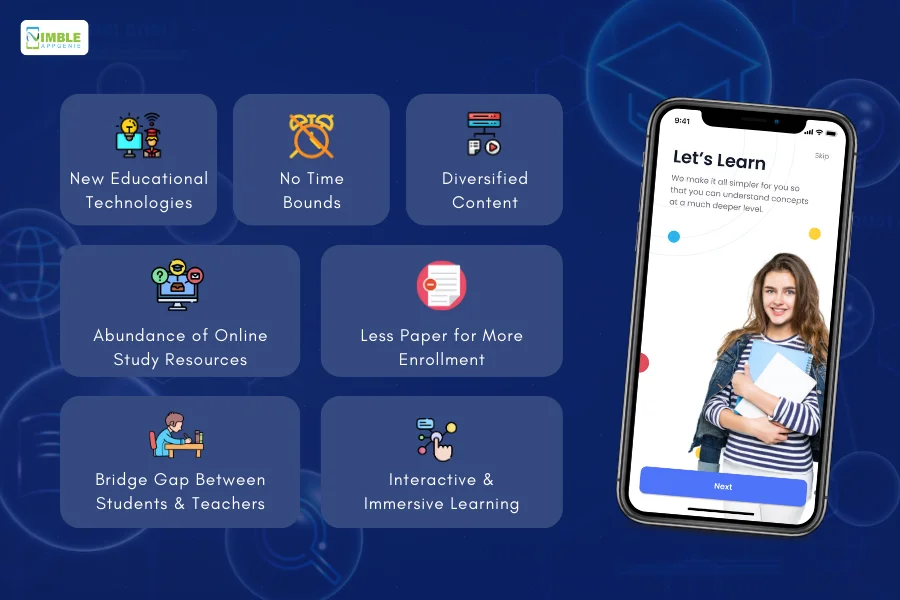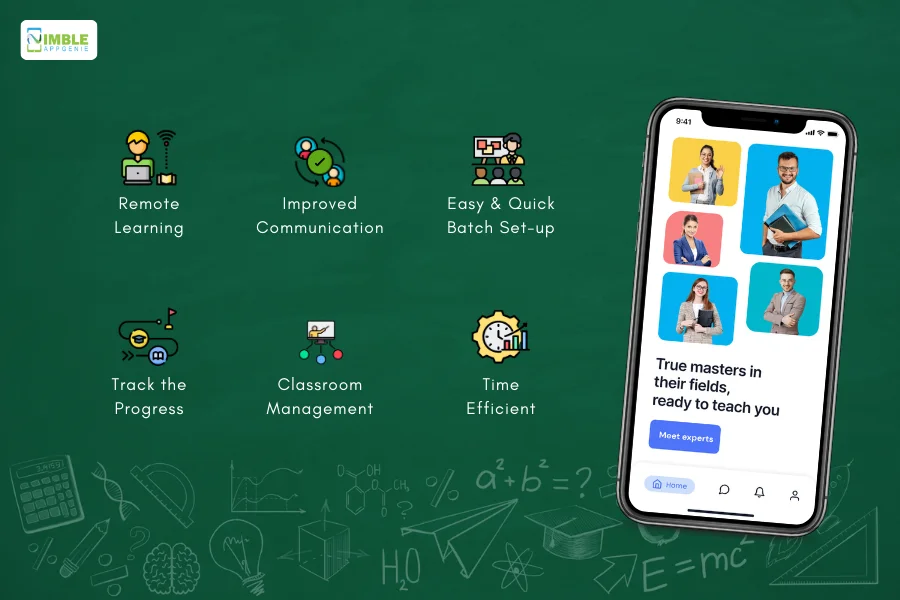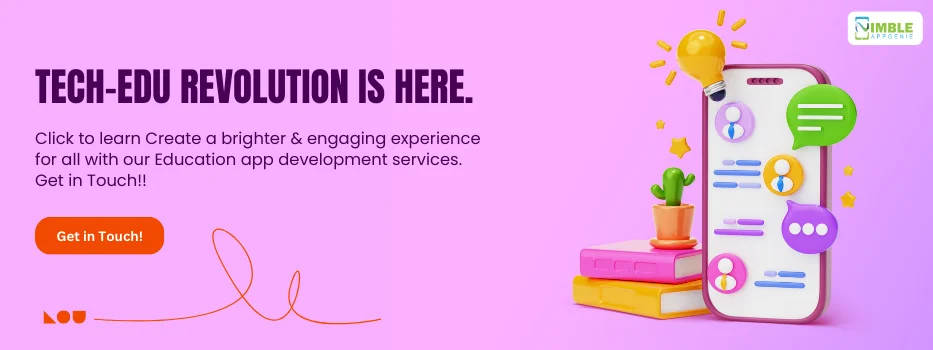Post-pandemic, the education industry has exploded with educational apps.
The sudden increase in such apps can be due to various reasons, such as learners can quickly get help to understand a topic, read & learn from anywhere, & much more.
The global education market is going to expand at a CAGR of 28.61% between 2022 & 2027. The growing focus of companies to make learning easy for students will surely fuel the market.
As we speak highly of educational apps, many of you might still wonder what the benefits of educational apps are. Why are they getting so popular among people?
In this blog, we shall be discussing the advantages of educational apps with some facts & get to know about how they are making children’s lives easier.
Global Educational App Market Size
The growing market of educational apps is surely a good indicator of the benefits they are providing.
First, let’s get to know about the market size of this industry & then we will talk about those benefits that are making them user-favorite.

As per the new survey, the global e-learning market is going to grow at a CAGR of 15.87% between 2022 to 2027. The market will likely grow by $192.79 billion.
While we are at the stats, here is a small glimpse of the user base & engagement.
- Educational app installs spiked 17% from 2020 to 2021, then 3% in 2022, and now up by 123% in 2023 compared to 2019. With such numbers, 2024 also looks promising.
- Duolingo still stands tall among the most downloaded language learning apps & currently has over 575 million+ users on the app.
Popular categories of educational apps
- The success of language learning apps has inspired many to create a learning app like Duolingo, Memrise & Babbel. Indeed, they are the most successful app category in the education sector.
- Core subject apps including Science, Maths, technology, reading & writing are also in demand which helps learners of every age group.
- Different educational apps that help kids & toddlers learn counting, colors, and words in a fun & easy way surely surge the demand for such apps.
We believe that these stats surely paint a clear picture of the growing educational apps market & how they are transforming the learning landscape.
Investors see a bigger pool of customers & find the education sector a lucrative business opportunity. They are eager to enter this market with the assistance of a mobile app development company.
Now, let’s move forward in the next section to get knowledge about the benefits of educational apps.
Benefits of Educational Apps for Students

There are so many best educational apps in the market that serve enormous advantages.
These apps aren’t limited only to kids or students but have opened new boundaries for professionals too.
1. New Educational Technologies
Learning is fun, but not for everyone.
As a result, different technologies like AR & VR are integrated with educational apps to make learning engaging & fun for everyone.
These technologies are used vastly in different sectors, VR & AR in eCommerce, business logistics, tourism education, classroom education, and many more are changing the fate of different industries.
As per InfiVR, they have worked with different leading universities in medicine, aerospace & many others to provide advanced learning content through AR & VR. This has provided an immersive learning environment for learners & sped up the process.
Such technology increases the benefits of educational apps for students and boosts their learning differently.
2. Abundance of Online Study Resources
Looking at those heavy books can give a headache to anyone.
But, with educational apps by your side, forget about them and gain access to a wide-ranging library of different subjects from Business Management to Robotics, each & everything at your fingertips.
There are different types of educational apps available in the market as per diverse needs & requirements.
They are altering the way we used to access our education. It made learning more fun, engaging & efficient for students of different ages. This surely adds to educational apps’ benefits for students & gives them more reason to use them.
3. No Time Bounds
Unlike school hours, educational apps have the advantage that you can learn from them anytime & anywhere.
There is no schedule, no time limit; you get to choose at which pace you want to learn. This is surely one of the best benefits of using educational apps that helps users to study with more concentration.
Moreover, if a student needs to go back and review a specific topic, they don’t have to wait for the next class. They can easily open the app & refresh their memory.
As a result, when it comes to developing educational apps, businesses emphasize integrating multiple learning formats such as videos, games, and much more to cater to every student & personalize their journey.
4. Less Paper for More Enrollment
In landfill sites, paper makes up roughly 26% of waste.
As the government & NGOs are coming together to save the environment by reducing paper wastage, this shift to digital learning platforms is indeed an affirmative change leading to a considerable reduction of paper use.
Moreover, students can take notes on digital apps, and submit their assignments digitally as well as teachers can grade them through the app without the need to use paper. These are some benefits of educational apps that one can look forward to.
5. The Bridge Gap Between Students & Teachers
Educational apps help to bridge any & every kind of communication gap between students & institutions. This is one of the major educational app benefits among many we talked about.
First, apps help students reach out to teachers, discuss their concerns, and get immediate feedback at any hour of the day.
Secondly, these apps can be accessed from anywhere with the help of an internet connection, so even if students are off-campus they can still reach out to know about any updates or join meetings.
Besides, these educational apps are also helpful in connecting for teamwork to finish a topic or a project.
So, be it teachers or institutions, to build better relations with their learners, they are taking the help of educational apps.
As a result, businesses are constantly working to bring more improved & better educational apps. And if it’s done with the right education app business model, it can generate a lot of revenue for them as well.
6. Diversified Content
With so many different platforms such as educational apps, language exchange apps, learning platforms, etc. available, the content pool is also massive.
With a variety of options, it becomes easy for learners to choose from. They can try out some of the platforms, see their content, and choose the rights as per their needs.
Furthermore, different technologies such as artificial intelligence in mobile apps have encouraged the use of such apps as these apps make sure to bring abstract concepts to life.
What we want to say is that these apps surely cater to a variety of learning styles, interests, subjects, etc. by providing immersive content and making learning more fun & engaging.
With so much content & platforms available, these apps help make education better, accessible, and engaging for your kids.
7. Interactive & Immersive Learning
One of the primary educational app benefits for students is that it provides interactive & immersive learning.
Unlike traditional schools, students don’t have to yawn & sit in class, these apps do not force you to sit.
Instead, they provide engaging content & interactive sessions that make you feel you should learn from them.
The reason why these apps are becoming more and more immersive is also due to the adoption of AR & VR.
Imagine dissecting a frog without doing it or being able to see any extinct civilization, Amazing right? Well, this is what AR & VR are doing and ensuring that complex concepts can be made easy, & memorable.
As a result, the education industry is among the top 5 industries using Virtual Reality & Artificial Intelligence and harnessing their power to improve learning journeys.
Benefits of Educational Apps for Teachers

As you can see above, the given advantages are more student-oriented, aren’t they? But, is that so that only students benefit through Educational apps? Probably No.
So, let’s get to know the benefits of educational apps for teachers in this next section.
1. Remote Learning
The traditional classroom has some challenges. During the pandemic, it became compulsory for teachers to choose online classrooms to teach their kids.
This turned out to be more effective than traditional classrooms, which is why 49% of professors approve of online learning.
The dedicated apps have different features that empower teachers & fulfill the purpose of educational software. Let’s understand with an example.
Have you heard of study apps like Quizlet? It helps teachers create diagrams & audio pronunciation of different scientific terms which they can share with the class.
Another example is Class Dojo, this app can help history teachers to build lessons and share about ancient world history through images, and videos. It contributes to children learning faster & better.
2. Improved Communication
One of the essential features of online eLearning websites or apps is to improve communication & remove every kind of barrier between teachers and students by establishing proper communication channels.
These educational apps surely helped to improve communication. Just look at apps like Remind that help to share updates with parents & students in one go. So, no one remains in confusion.
It is surely safe to say that the benefits of educational apps go to teachers & institutions too to maintain an open & effective communication environment.
3. Easy & Quick Batch Set-up
Batch- Set up is a tedious task for teachers.
But with the right educational apps, managing batches becomes effective & transparent. These apps help teachers to quickly inform students about the schedule & remain stress-free about any intruder getting in the class.
Moreover, a teacher can get a grasp of the class details & performance reports. Among the many other benefits of using educational apps, an easy batch setup remains at one.
4. Track progress
As we said earlier too, every kid is different and has a different progress speed in learning. Teachers must know about the growth made by their kids.
One of the major educational app benefits for students & teachers is that it allows teachers to track the progress of every kid.
These educational apps can provide insights about all the kids in class. Through this, teachers can adjust the learning material & lay more emphasis on students who are lacking in the class.
5. Classroom Management
Managing the chaos of the class is a nightmare for every teacher.
But, don’t worry, with the right educational app in your hand, you can streamline & easily manage your classroom.
These platforms create a safe space for both children & teachers to connect. Apps like Dojo offer many rewards & perks that motivate students to take classes & participate in them.
Moreover, to personalize the learning experience of every student & tailor them accordingly, businesses also take the help of emerging educational & LMS trends that help teachers engage with their children more & better results.
6. Time-efficient
Teachers also want to spend time with their families & children.
Using an app that helps to deliver a better experience & top-notch study material to students is a major relief for any teacher. With educational apps, you can do just that in less time.
Hence, time efficiency is one of the major benefits of mobile apps in education.
Imagine you don’t have to sit late at night to review your student’s grade; Apps like Quizizz can do this for you.
Whereas, to prepare lessons and content for your students, teachers can use common core sheets. By leveraging such features, teachers can utilize their time for their family & mental well-being.
Overall, it is clear that several educational app benefits cater to various needs & requirements. This growing market of education is not only assisting teachers & students but also inspiring businesses to custom LMS development from scratch & to fill the gaps in the market.
How Can Nimble AppGenie Help You Build a Top-Notch Educational App?
The global mobile learning market is likely to reach $80.1 billion by 2027. It is safe to say that the adoption rates of education apps will go higher.
At such times, if you have an educational mobile app idea, you should partner with Nimble AppGenie, the best education app development company.
To be on the winning side in this competitive market, you should take the help of our best & professional developers who can ensure high-quality, & engaging educational apps. With us, you get what you dream.
If you want to bring your idea to reality, contact us. Also, within a few hours, you will hear from our experts about your requirements.
Conclusion
In essence, the benefits of educational apps are enormous. Once you search for the best educational app for your needs & use it, you will get to know why we speak so highly of them.
With features like flexibility, real-time feedback, interactive lessons & much more, these apps are here to stay. As more innovative technologies are integrated into these apps, they will flourish in the market.
Regardless of the type of educational apps, it is safe to say that educational apps are the future of learning, and if you want to enter the market, then ensure to enter with the best.
Remember, your app is not just a product, but a lifetime commitment of valuable experience for your users.
FAQs
Through educational apps, students can learn a lot, and gain a deeper understanding of any topic. They get access to interactive educational sessions, effective tools, videos & audio that make learning new topics easy & memorable for every user.
Educational apps have many benefits for students such as learning about new topics faster & quicker, they also help students to access study material from anywhere and anytime & much more. Such features improve the study habits of learners and help them to do better.
These apps also benefit teachers by helping them streamline classrooms, knowing the progress of their students, grading students, and much more. Overall, these educational apps are beneficial for both teachers & students.
Yes, apps like Duolingo, Udemy, Quizlet, etc. have reinvented new possibilities in learning. They have allowed students to learn at their pace, and gain knowledge of different subjects easily & efficiently.

Niketan Sharma is the CTO of Nimble AppGenie, a prominent website and mobile app development company in the USA that is delivering excellence with a commitment to boosting business growth & maximizing customer satisfaction. He is a highly motivated individual who helps SMEs and startups grow in this dynamic market with the latest technology and innovation.
Table of Contents





No Comments